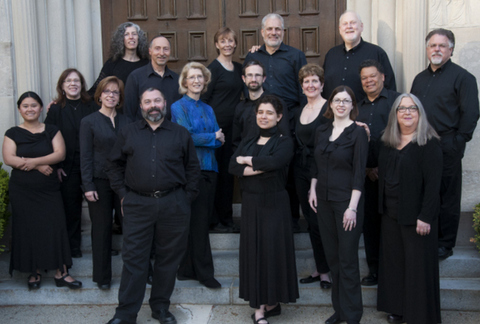A divinely inspired program by the Seraphim Singers
Composers from Guillaume de Machaut to the agnostic Ralph Vaughan Williams have sought to express the divine in music. Yet the myriad songs and choral settings that have appeared over the centuries reveal that ideas about the divine remain elusive, unknown, or, perhaps, unknowable.
In a soulful program heard Saturday night at The Eliot Church of Newton, Jennifer Lester and the Seraphim Singers reflected upon this age-old endeavor through convincing performances of choral music that spanned three centuries. Works by Johann Schein and Tomás Luis de Victoria were heard alongside settings of Biblical texts and poems by Vaughan Williams and Gerald Finzi. Yet it was the music by contemporary composers than left the deepest impression.
Gwyneth Walker’s God Speaks to Each of Us is a setting of a poem by Rainer Maria Rilke. And in this vivid portrayal of one’s personal relationship with God, chant-like lines unfold into glistening harmonies that are left unresolved for long stretches of time.
Christina Whitten Thomas’s The Deceiver captured the palpable anger, despair, and eventual acceptance over Christ’s fate in his own troubled time. Thomas’s radiant vocal writing ends on a concluding dissonance, which leaves open the question about Christ’s benevolence: as man and deity, he is at once a healer and a vengeful judge.
Perhaps the most familiar divine encounter is the story of Saul’s conversion from the book of Acts. Egil Hovland’s Saul sets this life-changing episode in a unique way. Unlike Heinrich Schütz’s declamatory setting, Hovland’s score is refined but not restrained. Individual singers chant texts at their own pace, like multiple prayers intoned at once. The chatter erupts into ear-shattering harmonies, and organ figures crash onto the texture like falling rocks. The narration, delivered with conviction by Seraphim member Mark Nemeskal, relates Saul’s experience until the voice of Christ, portrayed by the chorus, responds to his actions in unexpectedly soft phrases, a quiet, uncomfortable thought amidst the chaos.
The Seraphim Singers sang each work with aplomb. Strong in all sections, this forty-member chorus is capable of an attractive and fluent balance that rivals Boston’s best vocal ensembles. Sopranos beamed in their upper register, and baritones and basses, with spot-on intonation, supplied weight and gravity to the sound. Lester, leading with swift waving gestures, kept each composition moving with forward momentum.
A few selections on the program spotlighted smaller sections of the group. Set up in the back of the church, half of the singers, led by Paul Keene, delivered Victoria’s Resplenduit facies ejus with delicacy. Up front, Lester led another group in a silvery Maria Magdalena et altera Maria by Schein. In Victoria’s O sacrum convivium!, the men of ensemble, led by John Totter, joined their voices for rich, idiomatic vocal blend. The women then sang Poulenc’s Ave verum corpus, taking care to shade the music with tasteful light and dark tones.
In James Woodman’s The Annunciation, the singers showed just how exquisite the sound of a full chorus can be. Each section of the ensemble layered achingly beautiful phrases over one another to convey Edwin Muir’s text, which tells of Mary and the Archangel Gabriel engaged in a trance. Graham Gordon Ramsay’s Mirabile mysterium was just as enthralling as the singers unfolded the composer’s warm, tonal writing with chant-like intimacy.
Lester carefully navigated the thick textures of Brahms’ Im Herbst, and the singers swelled their voices for powerful concluding statements in a desperate plea against the dying of the autumn sun. Seraphim’s performance of Schumann’s An die Sterne, however, didn’t quite have the dynamic subtlety for the song-like strains of this double-choir score to come off effectively.
But at their fullest, the Seraphim Singers were resplendent. The smooth melodies of Vaughan Williams’ The Voice out of the Whirlwind, a choral setting of the eighth scene from the ballet Job, coalesced into harmonies of earth-shaking strength. The final cataclysmic organ figures, played with authority by Colin Lynch, seemed to encapsulate all of God’s pent up anger at Job.
Finzi’s Welcome Sweet and Sacred Feast offered profound, abiding peace. Scored for chorus and organ, this Eucharistic motet is a dramatic musical spectacle. The choir performed it vividly. Difficult key changes were handled with clarity and precise intonation, and Finzi’s supple and occasionally thorny lines left shimmering resonances in their wake. Lynch supported the singers with sensitive organ accompaniment.
Velvety textures also characterized Frank Ferko’s Llama de Amor Viva, which featured the ensemble in passages that blew through the air like a refreshing breeze. Ferko’s score builds to a glittering climax on the text “your sweet breathing filled with good and glory.” The singers rendered it with fire and intensity, revealing how connections with the divine are always a deeply personal experience.
Posted in Performances





